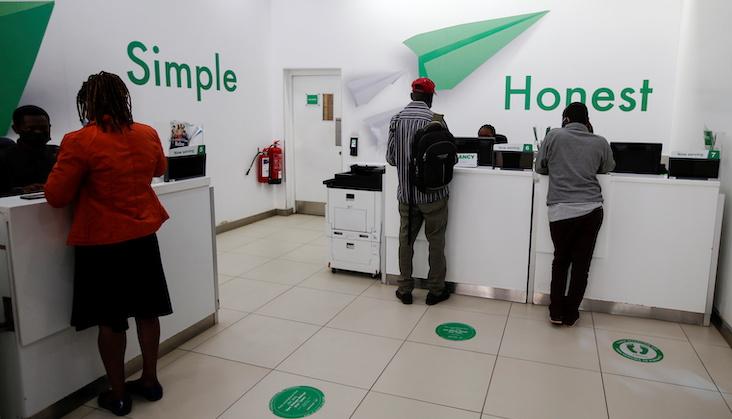Africa-Press – Mauritius. Covid-19 led to widespread regulatory limits on mobile money transaction fees to boost financial inclusion through the pandemic. How have the controls impacted mobile money operators, which earn 80%+ of revenues from transaction fees? It looks like the controls are here to stay in some countries.
In others, like Tanzania, Vodacom and Airtel successfully lobbied to remove a mobile money tax. Africa’s two biggest mobile money markets – Kenya and Ghana – were early movers to scrap fees on mostly smaller transactions soon after the pandemic hit in early 2020.
Other African nations soon followed with fee limits and mobile money tax relief. Regulators and central banks in more than 20 African countries paused or reduced mobile money taxes while raising limits and imposing transaction fee restrictions or waivers on mobile service providers.
Côte d’Ivoire, Senegal, Rwanda, Malawi, Uganda, Kenya, Nigeria, Gambia, Mali, the Democratic Republic of the Congo, Liberia, Egypt, Morocco were just some of the countries to impose controls designed to empower millions of mostly person-to-person (P2P) and cash-to-wallet retail mobile money users at the height of the pandemic.
Eighteen months on, certain governments have reintroduced or increased mobile money taxes to help replenish pandemic hit coffers while some cross-border transfer fee caps persist.
The central bank-led measures have proven highly effective at boosting financial inclusion and are likely to remain in some countries for the foreseeable future. Initial negative attitudes by mobile money operators are slowly changing in some markets but are being reinforced in others. Proactive: Ghana
The Ghanaian government issued fee controls and raised sending limits on cross-border transactions as the pandemic hit and reaffirmed some of those measures 12 months ago.
For Andrew Takyi-Appiah, managing director of Ghana-based ZeePay, which operates in 15 African countries and turned over $1.1bn in 2020, Ghana’s actions brought transparency and efficiency while expanding mobile money penetration.
“I must say the administration has been very strong in terms of growing the digital ecosystem,” he said.
“They seem to be figuring out that allowing cross-border outbound transactions will not affect financial stability if the right policy framework is in place.
“People are sending more money from abroad and sending more cash because of COVID.
People have decreased the pocket sizes but increased the velocity – so more weekly than monthly remittances,” Takyi-Appiah said. The return of transaction taxes Conversely, mobile money operators have railed against new taxes introduced in some markets on cross-border and other transactions.
Tanzania, which during the pandemic had waived a pre-existing 10% tax on mobile money transactions, imposed a new pocket-dependent levy on mobile money transactions in July this year to finance COVID-provoked public spending programs.
The Tanzania Mobile Network Operators Association – which represents Vodacom and Airtel among others – lobbied the Tanzanian government to reverse the tax it said had knocked mobile money usage, especially among the poor and small businesses.
The levy also reduced competition and incentive to invest in network infrastructure, agent networks and services, the Association said. The lobbying was partially successful as Tanzanian regulators cut the levy by 30% a few months later.
Similarly, a 1% tax on mobile money transactions in Uganda was cut in half after sector protest. Multiple approaches to mobile money fees But mobile money majors have been more positive on transfer fee caps, seeing them as onboarding opportunities, and have spread fee restrictions or waivers more widely.
For instance, Airtel Africa scrapped all fees on transactions of any size conducted within its 14-nation network across SSA, a measure that remains in place today. Others followed suit but many rolled back fee reductions that often only had 30-90-day lifespans.
South Africa-based MTN in March 2020 for example issued 90-day waivers for small transaction fees in South Africa, Rwanda, Zambia, Liberia, Cameroon, Uganda, Nigeria and Ghana but began reinstating them in some countries by summer last year.
These kinds of actions were replicated across SSA in the varied patchwork of government and corporate responses to the pandemic’s first wave. And subsequent COVID-19 outbreaks have caused further shifts in fee structures and regulator mandates.
Many providers have instigated agreements to minimize fees for cross-border transactions, such as M-Pesa’s deals with MTN Rwanda and Uganda. Mergers and acquisitions – such as ZeePay acquiring Mangwee in Zambia in April this year or MFS Africa buying Baxi in Nigeria- are further reducing costs.
Cross-border concerns The pandemic’s effect on mobile money movements has led to calls for unified cross-border regulations to smooth money flows and improve market security procedures like Know-Your-Customer (KYC).
Takyi-Appiah backs pan-African passporting. “I don’t think we should have a centralized regulatory platform because our markets are unique but pan-African passports should be allowed.
It breeds competition and is good for the market. ” Around 85% of ZeePay’s mostly retail operation is cross-border, mostly with other African nations and through the French diaspora.
Targeting intra-African trade-based remittances, a just-launched initiative from Egyptian bank Afreximbank and the African Continental Free Trade Area (AfCFTA) called the Pan-African Payment and Settlement System has the backing of many central banks including those of Nigeria, Gambia, Ghana, Liberia and Sierra Leone.
It seeks to facilitate trade in Africa and simplify and reduce the cost of cross-border transactions. Orange: ‘COVID-19 discounts were only a first step’
For French telco giant Orange’s west African-focused mobile money operation, Orange Money, COVID-19 only accelerated its own actions to boost financial inclusion and cross-border transactions through its networks in 17 African countries.
“We have put in place fee reduction measures in conjunction with the Central Bank of West African States (BCEAO) to support governments during the pandemic,” said Patrick Roussel, director of Middle Eastern and African Mobile Financial Services at Orange Money.
BCEAO operates within the West African Economic and Monetary Union (WAEMU) whose eight member states are Benin, Burkina Faso, Côte d’Ivoire, Guinea-Bissau, Mali, Niger, Senegal and Togo.
During the pandemic Orange has seen individual cross-border transfers increase 70%, accounting for $1.75bn in the past year. “COVID-19 discounts were only a first step.
Cross-border transfers are a priority,” said Roussel. “We have been progressively decreasing our tariffs for international transfers. It’s important for Orange Money to unleash international remittance,” he continued. Revenue hurdles in 2020
The challenging economic climate has increased Government-to-Person (G2P) and cross-border transaction volumes but meant smaller individual transaction pockets – resulting in SSA mobile money revenue dips of between 5-20% depending on the country and the analyst in question.
For Takyi-Appiah and ZeePay, low cross-border transaction fees have been and remain non-negotiable – and made more achievable by the fact low-infrastructural and operational costs permit mobile money operators like ZeePay to onboard customers for about 5c, compared to north of $1 for a typical telco.
2021 turnaround
Coming into 2021, the picture is brightening as SSA economies return to positive growth and mobile money users and pocket sizes approach pre-pandemic levels.
The Central Bank of Kenya, which continues to impose fee restrictions, reported all mobile money transaction revenues were up 6.5% to about $30bn in the first half of 2021.
After a challenging first half to its financial year (April 2020- March 2021), Safaricom’s Kenyan-based M-Pesa operation picked up in the second half to end the fiscal year with revenues down just 2.1% to 82.6bn shillings ($765m), still enough for M-Pesa mobile money to pass voice for the first time to become Safaricom’s top revenue division.
Airtel Africa, owned by Bharti-Airtel, saw mobile money revenue jump 34% from $100m in Q3 2020 to $135m in Q3 2021. In the same period, it added 19% more subscribers – from 20.1m to 23.9m.
These are encouraging recovery signals given GSMA warnings that remittance fee pricing controls would decimate the source of 87% of mobile money revenues according to a June 2020 survey.
For More News And Analysis About Mauritius Follow Africa-Press







